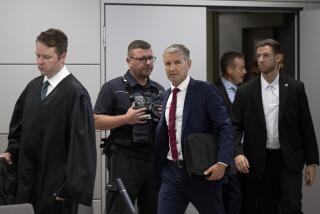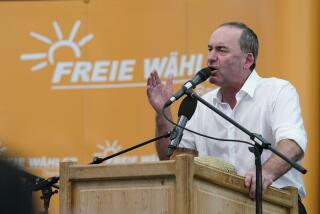Kohl Criminal Inquiry Ends, but Case Not Over
BERLIN — German justice authorities announced Friday that a criminal investigation of former Chancellor Helmut Kohl has been closed in exchange for his payment of a $140,000 fine, but the political financing scandal that has besmirched his reputation appears far from over.
Dropping the inquiry closes the door to criminal charges but leaves the former leader with no grounds to invoke a right against self-incrimination under questioning in a parliamentary probe still underway.
Kohl has repeatedly refused to reveal the sources of at least $1 million in unreported and therefore illegal donations to his conservative Christian Democratic Union in the early 1990s, although he has acknowledged accepting and hiding the payments.
Those admissions more than a year ago forced Kohl--a man revered by many Germans as the architect of their 1990 reunification--to resign as the CDU’s honorary chairman and plunged the conservatives into a political crisis from which they have yet to recover.
German law provides citizens with a right against self-incrimination similar to the U.S. Fifth Amendment protection. But Kohl is not known to have invoked that right in his repeated refusals to answer investigators’ questions about who slipped him the illegal donations and what government favors might have been expected in return. One member of parliament who sits on the committee investigating Kohl’s handling of party finances said Kohl has simply confronted his interrogators with “contemptuous silence.”
Although Kohl no longer has a legal reason for refusing to disclose his secret benefactors, there are profound doubts among political analysts that the parliamentary investigative committee will take serious action to punish him for refusing to cooperate.
The panel could hold him in contempt and even order his jailing, but few expect such severe action, because the ruling Social Democrats might have their own skeletons of financial shenanigans lurking in the political closet.
Even President Johannes Rau, now nonpartisan but previously a prominent member of the left-of-center Social Democrats, has been grilled over the last year about accepting flights and other considerations from businesses interested in political favors.
The deal Kohl cut with state prosecutors in Bonn, the former capital, stipulates that his payment of a 300,000-mark fine “does not constitute an admission of guilt.”
The court made clear that Kohl’s lifelong public service, including his 16 years as chancellor and quarter-century as CDU leader, influenced the decision to allow him to settle the case without formal charges being brought.
“Kohl did not personally enrich himself and has paid back the damages. Once the proceedings are suspended, Kohl will be considered innocent with a clean record,” court spokeswoman Susann Ulbert told a news conference.
The 70-year-old former chancellor, who retains a seat among fellow conservatives in the lower house of parliament, has already collected nearly $4 million from supporters and his own resources to help defray fines levied on the CDU for illegal financial dealings.
Kohl has three months to pay the $140,000 fine in lieu of further proceedings. Half of the money is to go to government coffers and half to charities.
Kohl attorney Stephan Holthoff-Pfoertner contended that the court’s decision proves he did nothing wrong. But political opponents lambasted the agreement as a miscarriage of justice.
“Kohl gets away with a black eye--and the rule of law as well,” said Evelyn Kenzler, a lawmaker with the Party of Democratic Socialism, the reformed Communists of eastern Germany.
Franz Muentefering, general secretary of the Social Democrats under Chancellor Gerhard Schroeder, said the deal allowed Kohl to “buy his way out of” responsibility for breaking the law.
“He has no excuse now to keep silent before the parliamentary investigation,” Muentefering insisted. “He must name the names of his donors.”
More to Read
Sign up for Essential California
The most important California stories and recommendations in your inbox every morning.
You may occasionally receive promotional content from the Los Angeles Times.











